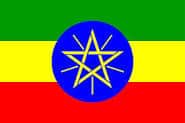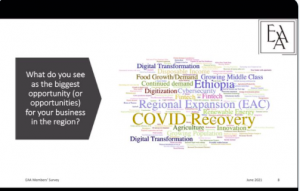Insights
The Eastern Africa Association is a source of insightful and helpful publications, guides, and advice for all visitors to our website. Contributors include EAA analysts, our Members, and a wide range of experts and official commentators. As a key service for Members only, we produce a regular Newsletter which contains our analysis of developments in the region.
You can search for material using the filters below, or access the latest publications in the library further down the page.

Ethiopia Update March 2025
Ethiopia continues to manage the stabilisation of the conflict regions in the country although this will not be an overnight fix. The economy is performing well despite the reduction in aid by the US and the fact that Ethiopia has not be reinstated to the AGOA scheme.
Read More
Ethiopia Update January 2025
Ethiopia is ramping up its plans to reform the economy and make it easier for foreign investors. The establishment of the Ethiopian Securities Exchange is a step in the right direction.
Read More
Ethiopia Update December 2024
Internal and external tensions continue to plague Ethiopia. The economy is benefitting from the Foreign Exchange reforms.
Read More
Ethiopia Update October 2024
Ethiopia’s current political and economic landscape is fraught with challenges. However, proactive engagement with international partners and strategic domestic reforms, presents opportunities for recovery and stability. As the nation strives to stabilise its economy and manage public discontent, the collaboration with the regional and international actors such as the IMF provides an important lifeline.
Read More
Ethiopia Update September 2024
Positive economic reforms, particularly the flotation of the Birr, continue to increase Ethiopia’s attractiveness as an investment destination, all while, concerns remain about the speed of implementation of these changes. The security situation in various parts of the country remain tense and new splits in the Tigray region threaten a return of instability there.
Read More
Ethiopia Update July 2024
The conflicts in Ethiopia are continuing with no obvious end in sight. A number of economic reforms are ongoing and the economy is growing despite challenges.
Read More
Ethiopia Update June 2024
Anxieties are rising over an apparent proliferation of new inter-regional and communal conflicts across different parts of the country, as well as a deterioration of long-running ones. This is having a detrimental effect on Ethiopia’s fiscal stability, exacerbated by a growing debt problem. However, the economy is showing robust growth and a National Dialogue process aimed at achieving settlement of various conflicts is finally underway.
Read More
Ethiopia Update April 2024
Concerns remain high about Ethiopia’s lingering internal conflicts, which threaten political stability and economic progress. Continued but slow progress continues on the economic front with the launch of the country’s securities exchange, and growth forecasts are down.
Read More
Ethiopia Update March 2024
Ethiopia continues to pursue its ambition to achieve access to the sea through its MoU with Somaliland, all while dialling down the rhetoric and pursuing a more diplomatic approach, which could open a path to talks with Somalia. A Cabinet reshuffle continues to consolidate Prime Minister Abiy’s hold on the administration. On international trade, the country made significant progress on economic cooperation with Kenya and compliance with a number of AfCFTA commitments.
Read More
